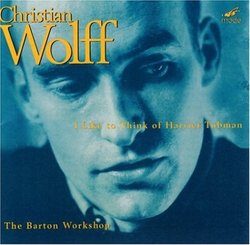The Feminist Movement could learn a few things from Wolff
04/12/1999
(5 out of 5 stars)
"The feminist movement, at least those who create art could take a couple of lessons from a man, Christian Wolff. I don't see women today who write music dealing directly with social-political subject matter. Instead I see them chasing a man's world simply wanting the same polished trophies,Pulitzers etc,and adopting a man's musical language. Wolff's music turned radical with the advent of the anti-war years in the late Sixties and has remained fervently as such ever since. It is curious how this engagement has transformed his musical language in to my mind a more fascinating aesthetic. Early he had a direct influence from John Cage writing coldly abstract pieces but not all that far from radical thinking. Except Cage hardly spoke in a class-conscious way. Wolff does and does it forcefully and with a fervent imagination for uniting image with an engaged sound. Take here "I Like To Think of Harriet Tubman" for three instruments(any who can cover the range) and female vocalist who recites the text by Susan Griffin. Tubman ran the Underground Railroad which freed countless slaves during the Civil War here. The instruments have a pulling and heaving and tossing effect, where the voice is almost fighting against them to be heard. We tend to listen more as a result. Also the purely musical yet with political reference is portrayed in the "Eisler Ensemble Pieces" Here with a chamber constitution of clarinet,violin,cello and piano, Wollf breathes languid-like phrases,gruff and wholesome with everyone playing together as if a collective expression was the only one worth sharing. There is also a richness Wolff obtains with an indeterminate like counterpoint,with instruments leaping and trading materials Voice leading which is not really functional nor predictable which makes it all the more interesting for the ears. The" Piano Trio", another classical combination of violin,cello and piano is dedicated to three women's peace encampments, Greenham in England, Seneca in New York State and Caniso in Sicily and again Wolff writes a self-contained expression of a unity. There is a lyricism yet angular and ugly a times, perhaps reflecting the ruggedness of living under a tent with a campfire and grimy plastic covernings as the women did with their children at Greenham.. Wolff political music has in an unpretencious way and an American feel and gesture, the unfinished quality and the indeterminatedness, as well as not being afraid of leaving such things as articulations phrasing and dynamics up the the discretion of the performers."


 Track Listings (12) - Disc #1
Track Listings (12) - Disc #1